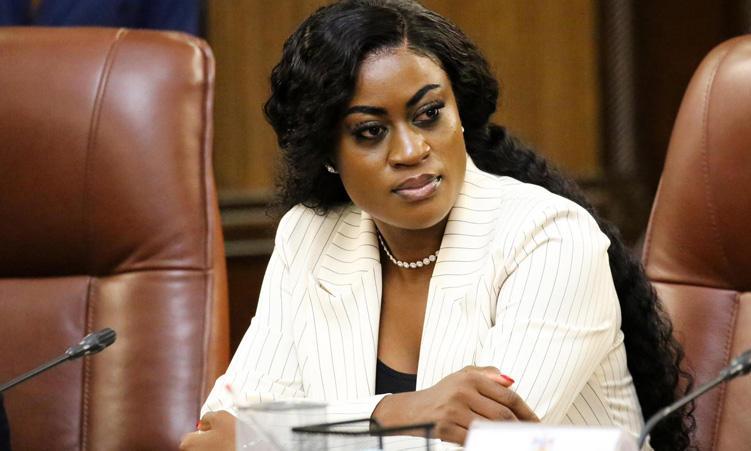
Esperance Luvindao
Africa-Press – Namibia. Esperance Luvindao, minister of health and social services, delivered in the National Assembly on 6 May 2025
I rise to introduce and motivate the budget for Vote 13: Ministry of Health and Social Services. I commend Ericah Shafudah, minister of finance, and Kaire Mbuende, director general of the National Planning Commission, for a well-crafted and articulated budget.
For the 2025/26 financial year, the Ministry of Health and Social Services is allocated an amount of twelve billion, two hundred and sixty-eight million, three hundred and seventy-two thousand Namibia dollars (N$12 268 372 000). This is about 4.4% of the gross domestic product, 11.5% of total budget expenditure, and 8.2% or N$927.4 million more than the previous year’s allocation.
Vote 13 comprises five main budget programmes through which key health and social services are provided. This vote is one of the bedrocks for social development and transformation of our country.
Today, I will share with this House some of the major achievements and programme outputs under Vote 13, recorded during the 2024/25 budget cycle. Additionally, I will outline how the ministry intends to utilise the funds allocated under the 2025/26 appropriation bill.
Programme 01: Health system planning and management
Achievements in 2024/25:
Over the past year, the ministry prioritised the development of Namibia’s digital health infrastructure and data systems:
Digital infrastructure expansion: All hospitals and 23 health centres successfully installed network infrastructure for the e-Health system. Tenders were awarded for infrastructure extension at 18 more health centres and 30 clinics. Five centres and 18 clinics are already operational, ensuring real-time access to patient records and health information.
Enhanced data management: Health data collection expanded to over 90 clinics beyond district and hospital levels. Medical Certification of Cause of Death completion increased from 45% to 70%. Forensic autopsy reporting exceeded 90%, and implementation of ICD-11 for mortality reporting is ongoing.
Public health information: Improved mortality data has enhanced health planning, resource allocation, and targeted disease interventions.
Planned activities for 2025/26:
The ministry is requesting N$62 522 000 to refine health data and policy support, including epidemiological analysis and research. Priorities include reviewing the National e-Health Strategy 2021–2025, advancing a TeleHealth Policy, expanding network infrastructure, and rolling out the next National Demographic Health Survey.
Programme 02: Curative and clinical health care services
Achievements in 2024/25:
Key investments were made in infrastructure and technology:
Oxygen and medical equipment: Oxygen generating plants were installed at Windhoek Central, Okakarara, Swakopmund, and Keetmanshoop hospitals. 152 infant incubators, 123 cardiotocography machines, ICU monitors, and ECGs upgraded neonatal and critical care capacities.
Oncology services upgrade: The cobalt-60 radiation machine at Windhoek Central was upgraded, improving cancer treatment precision.
Dialysis expansion: New dialysis centres were established in Katutura and Oshakati, with five more nearing completion in Keetmanshoop, Walvis Bay, Katima Mulilo, Otjiwarongo, and Rundu.
Planned activities for 2025/26:
N$11 517 164 000 is requested for:
Procurement vehicle development: Establishing a sustainable procurement system for medicines and clinical items.
Supply chain resilience: Upgrading logistics and storage to reach an 80% service level.
Critical care expansion: Renovations and new ICU units in rural hospitals including Opuwo, Outapi, Engela, and Nankundu.
Programme 03: Public health
Achievements in 2024/25:
Emergency preparedness: The Namibia Institute of Public Health was established in March 2024 as a ministry department.
Outbreak response: Cholera, mpox, and malaria outbreaks were addressed effectively.
Malaria control: Indoor residual spraying covered 85% of targeted areas.
HIV/AIDS response: Progress toward the UNAIDS 95-95-95 targets, with 95% ART coverage and widespread adoption of the Dolutegravir regimen.
Planned activities for 2025/26:
A request of N$114 365 000 will fund:
Operationalising the Namibia Institute of Public Health.
Intensified malaria elimination, HIV, and TB initiatives.
Expanded immunisation, maternal-child health, and disability services.
Sustaining HIV programmes despite donor funding cuts, with government-led procurement since 2016.
Implementing the “Roadmap Towards the Sustainability of HIV, Viral Hepatitis, Tuberculosis, and Malaria Control” and the “Social Contracting for Health Policy.”
Programme 04: Developmental social welfare
Achievements in 2024/25:
Rehabilitation and support services: The Etegameno Rehabilitation Centre treated adult inpatients and piloted outpatient programmes in three regions.
Family and community support: Services for gender-based violence victims and suicide prevention were expanded.
Planned activities for 2025/26:
N$37 423 000 is requested to:
Promote family well-being, parenting, and drug abuse prevention.
Expand Etegameno to include patients under 18 years old.
Strengthen support services for suicide-affected individuals and victims of gender-based violence.
Programme 99: Policy coordination and support services
Achievements in 2024/25:
Facilities and equipment: Clinics and TB wards were completed; major hospitals upgraded with backup power and water infrastructure.
Human resources: Approval for 11 742 new posts over six years; N$150 million allocated this year for 434 new recruits. The Integrated Human Resources Information System improved workforce management.
Policy adoption: Namibia’s Universal Health Coverage Policy was adopted in February 2025.
Planned activities for 2025/26:
N$536 898 000 is requested for:
Recruitment of health professionals, especially specialists.
Construction of nine new clinics and two health centres in remote areas.
ICU expansion and a new Windhoek District Hospital.
Completion of the Children’s Rehabilitation Centre at Etegameno.
Infrastructure maintenance and upgrades to decentralise healthcare.
Strengthening governance, accountability, and public-private partnerships.
The proposed budget allocation for Vote 13 will support the implementation of critical programmes and activities of the ministry. We express gratitude to our development cooperation partners, private sector, and NGOs for their continued support. The ministry is committed to prudent resource utilisation, as reflected by unqualified audit reports over the past three financial years.
For the sake of improved outcomes in the health and social services sector, I request members of this House to approve the budget allocation for Vote 13: Ministry of Health and Social Services, amounting to twelve billion, two hundred and sixty-eight million, three hundred and seventy-two thousand Namibia dollars (N$12 268 372 000) for the 2025/26 financial year.
I thank you for your support.
Source: The Namibian
For More News And Analysis About Namibia Follow Africa-Press





